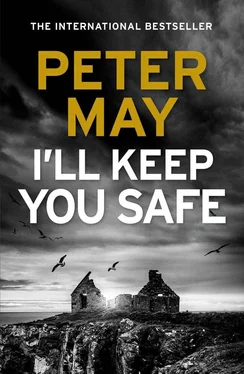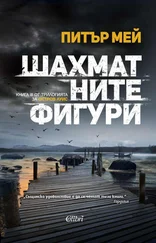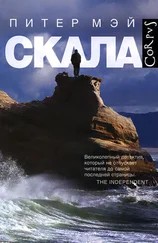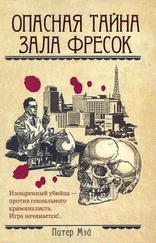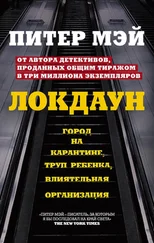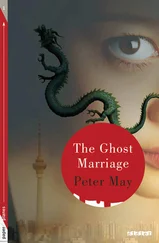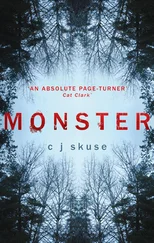He nodded. ‘I think that’s a good idea, Ma’am.’
When he was gone, she was tempted to order yet another glass of wine, but in the end decided against it and climbed wearily back to her room. She stood for a long time at the window gazing out over the inner harbour, seeing how the early-evening sunshine cast long shadows on the water. Gilles was right. She was a bad mother. And wife. There had only ever been one real focus in her life, and that had been her job. Other people sacrificed personal ambition for family. Not Braque. She had always put herself first. And now, as she found her life slipping away only too quickly and easily towards single middle age, here she stood, lonely and alone, in some strange hotel room far from home with no one to turn to but an island policeman she had just met. And herself. They both had damaged hearts. And she came up wanting.
The trill of her mobile phone drilled into her consciousness, dispelling introspection, and she fumbled in her bag to find it.
‘Lieutenant, it’s Marc Bouquand.’
It took Braque a moment to place him, before remembering that he was the ANSSI computer expert on attachment to her department. He had briefed her on the Dark Web, and found deleted emails on Georgy Vetrov’s hard disk.
‘I got that email you forwarded to me. From well wisher to Ruairidh Macfarlane. Interesting, when you start looking at the e-trail all these phoney IP addresses leave in the ether.’
‘It helped?’
‘Oh yes. With three different paths to follow you start to come up with points of correlation, which in the end lead you to the source.’
Braque felt her heart skip a beat. ‘You mean you know who sent them?’
‘Not who sent them, no. But it would seem you are in the best place to find that out. I know where they were sent from.’
‘The Isle of Lewis?’
‘More specifically, Lieutenant, from two different computers in the public library in the town of Stornoway. Two from one, one from the other.’
Braque felt her jaw go slack. She had walked past the library during a stroll through town the previous night. It was just around the corner in a rust-painted building next to the Argos store. ‘I’ll get back to you,’ she said quickly and hung up. She slipped her phone into her pocket and ran down the stairs, out into Castle Street and down to the harbour, hoping that she might catch Gunn before he drove off. But he was long gone.
She dialled his number and hurried back into the hotel. It was still ringing as she climbed the steps, then switched to voice mail when she went into the bar. ‘The emails were sent from the public library right here in Stornoway, Monsieur Gunn,’ she whispered into the phone. ‘Call me back.’ She hung up and found the barman looking at her curiously. ‘Do you know what time the library closes?’
The barman checked his watch. ‘You’ve missed it, I’m afraid,’ he said. ‘It closes at five on a Tuesday.’
The light summer nights lingered for a while in autumn. Or fall as the Americans would call it. A nice way, Niamh thought, to describe a season when leaves turn the colour of gold and fall from the trees. But not a word that anyone on these islands would ever think to use. There were no trees outside of Stornoway, and no leaves to fall.
As she stood on the clifftops and gazed across the moor, nothing grew more than a few inches for as far as the eye could see. Grasses burned and bowed by the wind. A wind that somehow characterized everything about this place. Blowing weather in, then ushering it away. In from the sea, out to the sea. The only constant in an ever-changing skyscape.
Niamh drew her parka around her, protection from the chill blowing now from the north. There was a change in the air. She could feel it. Something different, almost indefinable. Summer was finally gone and autumn, ephemeral and capricious, had turned its face towards winter. There was a quality, too, about the light, that was different. It slanted across the land, clear-eyed and cold, and even where the sun set in the west it lacked strength, an insipid yellow against the washed-out blue of the sky.
She had walked some way from the house, and stood now where the cliffs crumbled and fell away through a jumble of rock spoil to a tiny beach far below. Mostly shingle. But hidden from view, just to the right of it, a small patch of fine silver sand hugged the foot of the cliffs. Ringed by black rock, it remained, in clement weather, impervious to the incoming tide, a tiny oasis of calm, where she and Ruairidh had sometimes made love on warm summer evenings in the early days of their marriage. Today, with the heavy swell coming in off the Minch, it would become, at high tide, a foaming treacherous pool of turbulent white seawater dashed against the cliff face. But the tide was still a good way out, and she decided to climb down and revisit precious memories before they vanished for ever.
She jumped from a ring of crumbling peat on to a gentle slope descending to the shelf where she and Ruairidh had built their bothy from the stones of John Nicholson’s first house. It always, somehow, came as a surprise to her. Stone the same colour as the cliff, heaped around the face of it in a low round building that seemed almost subsumed by it. Perfectly camouflaged. She knew, from walkers who had come knocking at their door, just how difficult it was to find if you did not know exactly where it was.
A wall curved around one side of it, protecting and leading to a stout wooden door jammed shut by a boulder. She pushed the stone aside with her foot and unlatched the door to step inside.
She was struck at once by the warmth of the air, and the smell of peat smoke. There were two windows in the curve of the outside walls, and two triangular skylights in the roof, and so there was plenty of light to see by. She stooped and stepped down into the circular floor area, where a stout central wooden beam held up the roof.
A wooden bench sat below the far window, and to her left a wooden platform at waist height served as a table, or a bed for anyone with a sleeping bag who wished to stay overnight.
In the opposite corner they had built a tiny fireplace against the wall, with tin cowling to prevent smoke from seeping into the room. Niamh knelt now by the fireplace and felt the warmth that resided still among the ashes. She turned to look across the interior of the bothy. Beneath the bed lay a plastic bag that Ruairidh usually kept full of dried peat slabs. It lay on its side, most of the peat gone. All that remained of it, black crumbs and dust, strewn across the flagstones.
It was an inescapable conclusion. Someone had been here. Very recently. Maybe even earlier today. And perhaps for a day or two before that. Ruairidh’s peat was almost exhausted.
Niamh stood up and looked around for other clues. But there was nothing alien to be seen. No litter or belongings left behind. No cigarette ends. Had it not been for the burning of the peat, you would never have known that the bothy had been occupied.
She felt the first stirrings of disquiet, remembering the footfalls behind her in that dark Paris street. Then waking in the night to the sounds of what she thought was someone moving around the house. She had seen nobody since returning to Taigh ’an Fiosaich. Not a soul, except for the visitors who had arrived by car. And yet it was perfectly possible that some late-season walker had sought refuge here for a night or two without her being aware of it. That, after all, was its purpose. And she could not see the bothy from the house.
For some time, then, she sat on the bench by the window and marvelled at how effective this little stone hut really was at shutting out the weather and the sound of it. Perched here, beneath the lip of the cliff, its tiny windows looking out on to the mercurial Minch, a miniature protective bubble to keep you safe. I’ll keep you safe , Ruairidh had told her. But he hadn’t. Unlike the bothy they had built. That was still there, and probably would be long after she too was gone.
Читать дальше
